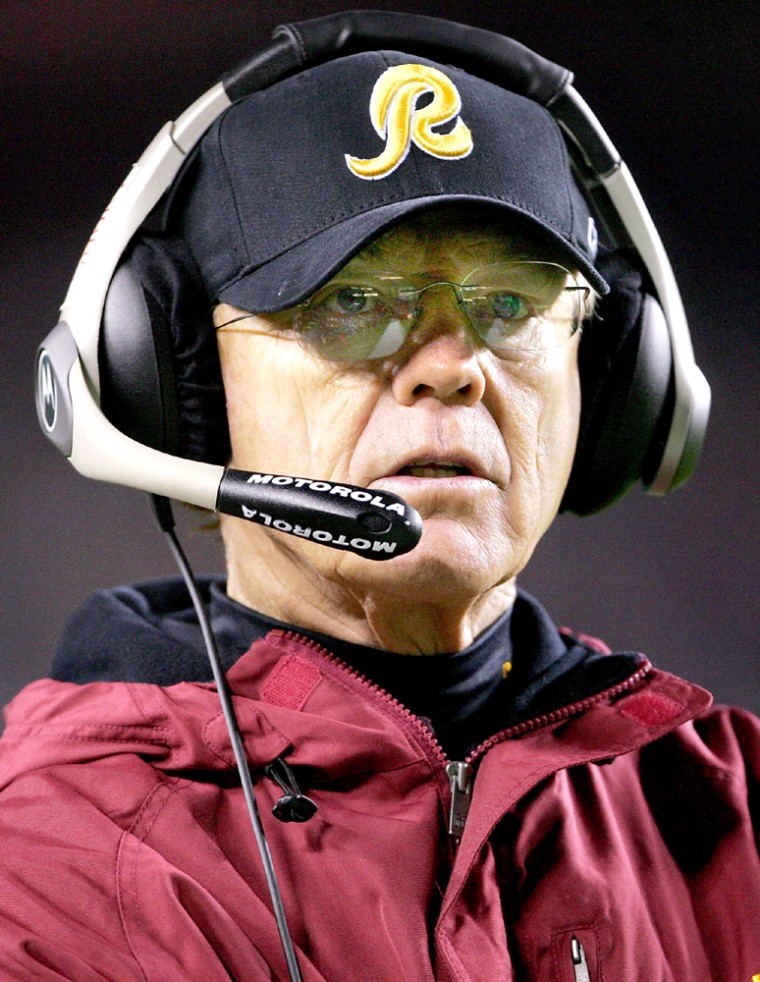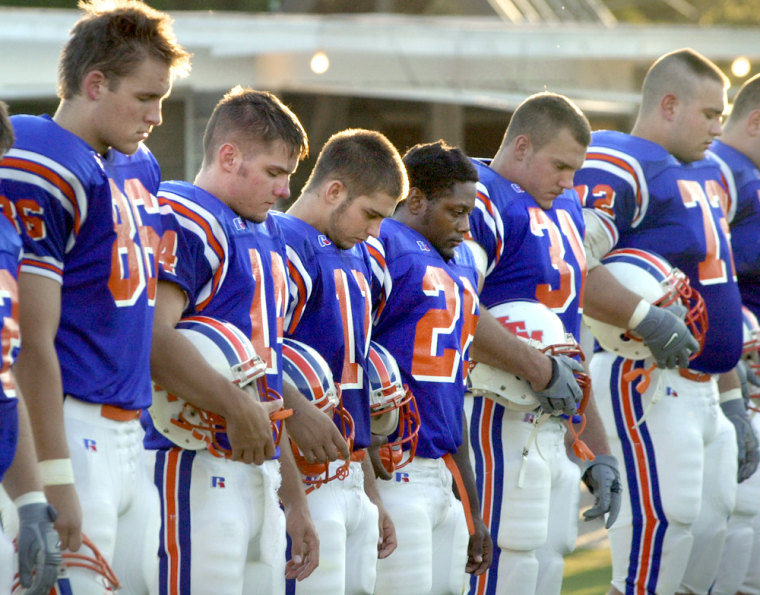Mark Myerson is not God. And that’s not good enough for Terrell Owens.
Myerson, one of the world’s leading foot and ankle specialists, concluded that Owens, the Philadelphia Eagles’ All-Pro wide receiver, was not fit to play in this weekend’s Super Bowl. Myerson, who operated on Owens to repair a severely sprained ankle and a leg fracture he suffered just seven weeks ago, said Owens risked career-threatening complications.
Owens, however, had a different idea. He plans to be on the field for the National Football League’s championship game.
“What a lot of people don’t realize is that I’ve been doing a lot of rehab on my own, a lot of healing on my own, but spiritually God is healing me, and I’m way ahead of where a lot of people expect me to be, even the doctor,” he maintained last week.
Then, this week, he insisted: “If you believe in miracles, just wait until Sunday. God brought me here for a reason.”
Such expressions of faith are almost part of the background noise in American sports. Barry Bonds points to the sky after cannoning another home run into McCovey Cove. After his team advances in the playoffs because the opponents’ kicker misses two field goals, Hines Ward, a wide receiver for the Pittsburgh Steelers, insists, “God was on our side.” Dwight Howard, the No. 1 pick in last year’s National Basketball Association draft, proclaims that he wants to use his faith to “raise the name of God within the league and throughout the world.”
Hunting the big game
The very public testimony of faith by athletes is no accident. It is only the most visible manifestation of a broad evangelistic campaign tentacled through all of America’s favorite sports.
The network extends far beyond the Fellowship of Christian Athletes and Athletes in Action. Virtually every sport comes attached with one or more non-profit Christian ministries, many with budgets in the millions of dollars. They flock to sports because that’s where the people are: The Super Bowl this Sunday is expected to attract more than 90 million television viewers — many of them children.
Norm Evans won two Super Bowls as an offensive lineman with the Miami Dolphins in the early 1970s. Today, he is president of Pro Athletes Outreach, a Christian sports ministry in Issaquah, Wash.
While Evans welcomes that opportunity to reach enormous numbers of people, he also wrestles with its implications, because the influence of a famous athlete can be powerfully out of proportion with reality.
“I remember this one little bitty kid — he couldn’t have been more than 5, 6 years old — came and he looked at me and he said, ‘Would you sign my hat?’” Evans said in an interview, recalling his playing days. “And this little guy was looking at me like I was God, and it chilled me.
“It chilled me because I realized I didn’t want him looking at me like that. He should be looking at God like that, for sure, or his dad.”
In sports, an open door
Sports authorities differ on how closely to embrace the marriage of athletics and the Almighty.
The NFL at times has taken steps to discourage overt religious expression, fining Jon Kitna, a quarterback for the Cincinnati Bengals, for wearing a cap bearing a cross during interviews. But it also sponsored explicitly religious events in its lead-up to the Super Bowl, including a competition among gospel music groups.
Other sports are more welcoming. With the formal recognition of Major League Baseball, Baseball Chapel appoints chaplains for all 210 major- and minor-league teams. Pro Basketball Fellowship has done the same for many NBA teams. Most visibly, during last year’s Daytona 500 stock car race, Bobby Labonte’s famed No. 18 Chevrolet sported an advertisement for “The Passion of the Christ,” Mel Gibson’s bloody depiction of the crucifixion.
“I think they’re thankful that we’re there,” said Billy Mauldin, president of Motor Racing Outreach, which runs a traveling chapel that follows NASCAR’s crews from track to track, organizing pre-race worship services. “We don’t hide who we are. People know where we stand, and if they want help, we’re going to take them where they can find that help.”
One for all, but all for One?
Sports and Christianity do mirror each other in significant ways.
Call it fellowship or communion, call it teamwork or cohesion, but it is the same thing: many individuals subsuming their interests to work as one toward a greater goal. That lesson may first be learned in Sunday school and carried to the playing field, or it may propel an athlete who learned it in Pop Warner football to a greater appreciation of his faith.
The figure commonly cited by those who work with them is that about a third of the players in the major American team sports are born-again or evangelical Christians — a little more in the NFL, a little less in the NBA and significantly more in NASCAR. Grant Teaff, the former head of the Fellowship of Christian Athletes who is now executive director of the American Football Coaches Association, has said as many as two-thirds of college football coaches are devout Christians.
But what if you’re a big-time player and you’re out of step? Do you go along with the prevailing godliness, or do you speak out?
“When you get to the professional sporting level, your No. 1 priority is team, and the No. 2 priority is yourself,” said Dave Silverman, communications director of American Atheists, an activist group based in Parsippany, N.J. “When you’ve got a coach and/or a large chunk of players that are doing this public religious display or this group prayer, if you’re not a member of that clique, you will do nothing to stop it because that will hurt the team.”
Staying silent even with something to say
That’s why, even though Silverman says there are prominent atheists in American sports today — an assessment with which Joel A. Freeman, a former NBA chaplain, agrees — you’ve never heard from any of them. Too much is at stake for them to speak out, from teammates’ ire at their airing locker-room secrets to the risk of walking away from millions of dollars in endorsements pitched to a nation that is more than 90 percent religious.
“There are non-theistic players out there — any number of them,” Silverman said in an interview. “But I’m not at liberty to display any names of them, because they all have chosen to remain in the closet.”
And since the dominant religion in American sports is Christianity — specifically a muscular, fundamentalist-tinged style of evangelicalism — there are pressures to conform that can be uncomfortable not only for atheists, but also for believers of other faiths, such as Jews and the NBA’s growing number of players from Muslim countries.
Even though American Atheists recognizes no deity, “we do have a common cause with Jews and Muslims and even Christians who don’t want to see their faith lessened,” Silverman said.
Many athletes, even spiritual ones, also take issue with teammates who credit their stellar performances or their teams’ victories to God’s influence. That diminishes the hard work and talent they bring to the table on their own, and it implies that in siding with your team, God wanted the other guys to lose.
It’s a dividing line that can, if handled inappropriately, destroy a team, said Evans of Pro Athletes Outreach.
“If a guy is living a lifestyle that goes along with everybody and it’s not, quote, ‘a Godly lifestyle,’ and then he changes ... how would you take that if you’d been riding down that trail with him?” Evans asked. “I think there’s a natural tendency to feel you’re being judged.”
On the other hand, Evans said, athletes have an “amazing responsibility because the fans idolize them. ... They have a platform whether they want it or not, and with every platform comes a responsibility. I think that’s America’s responsibility, to be good citizens and good people. ... We’re like nobody else in the world.”
Walking a narrow line
Every sports minister and counselor consulted for this article said their operations were sensitive to the concerns of the non-religious athlete and those of other faiths, stressing that they were never confrontational when they addressed players.
“I’m a Christian, but I have a profound respect for other belief systems,” Freeman, who was chaplain for the Washington Bullets and Wizards for 19 years, said in an interview. “God gave me two ears and one mouth. I think there’s a parable there.”
For that reason, said Freeman, who now runs a Christian leadership institute outside Washington, chaplains never pray for their teams to win. Instead, “we asked for an injury-free game. We asked for God to help them work through their frustrations.”
And almost unanimously, Christian activists in the sports world singled out one man as the example of how to succeed in sports while living a visibly Christian life: Joe Gibbs, the Hall of Fame coach of the Washington Redskins and owner of one of the most successful teams in NASCAR.
“Joe is a guy who, in the right kind of way, a mature way, expresses his faith,” Evans said. “That doesn’t take away from what kind of man he is or how he would deal with a Muslim ballplayer. It probably makes him better at it.”

Mauldin, of Motor Racing Outreach, said: “No man or woman is perfect. But many people have seen [Gibbs] in the quiet moments as well as the public moments. And they’ve seen the same person in both situations. They realize it’s not just his religion. It’s his lifestyle; it’s who he is.
“There’s a lot of folks who can profess religion, but is there a lifestyle that’s reflective of that? And that’s what you’ll find with Joe.”
If every Christian sports figure were so virtuous, the sports world would be much more inclusive, said Silverman of American Atheists — more reflective of the core diversity of America than just the simple colorblindness for which it is often praised.
He said: “I think it’s a responsibility more of the coaches, I think it’s the responsibility of the team owners to say, ‘Hey, we’ve got non-Christians on our team, and we’re going to be a football team now, not a Christian football team.’”
